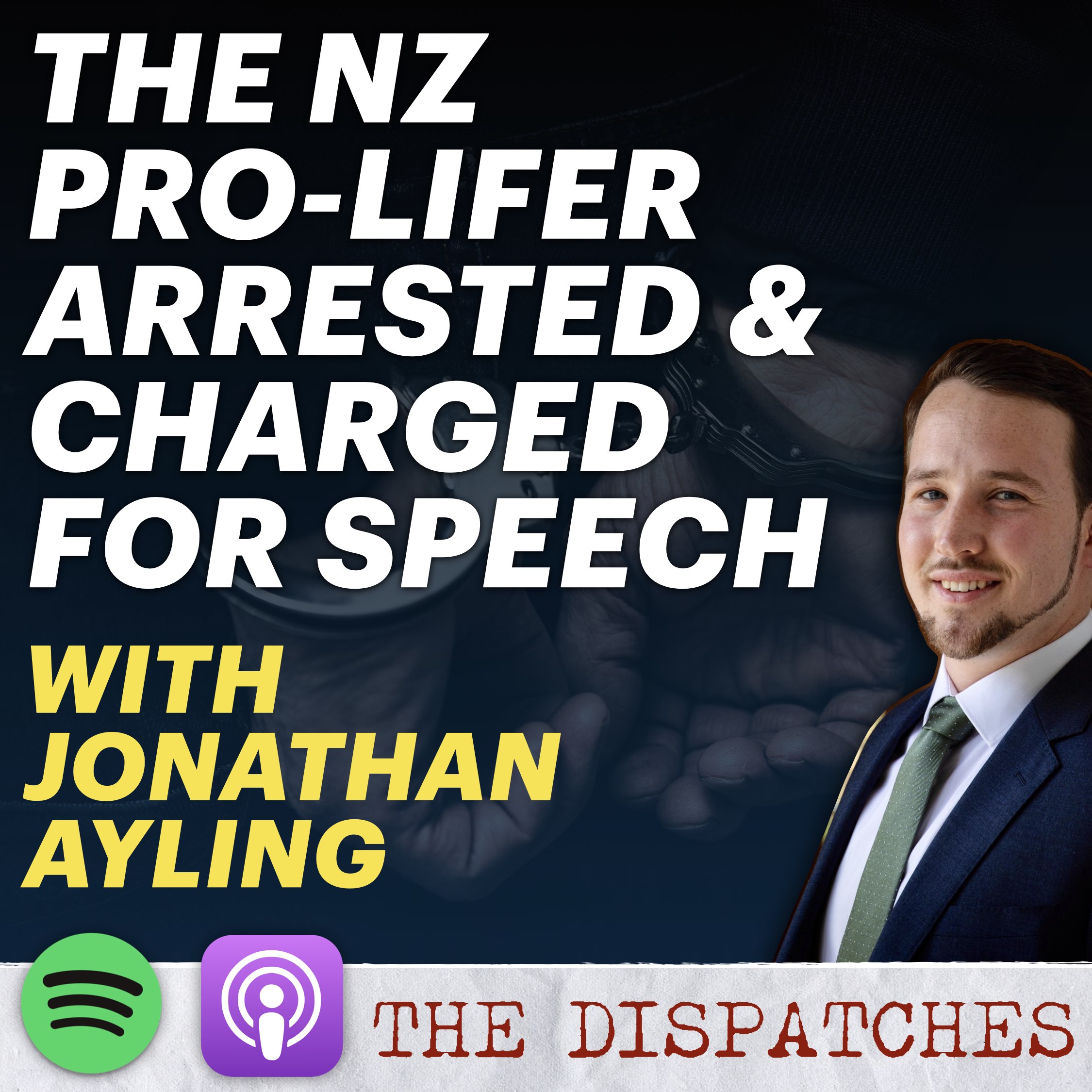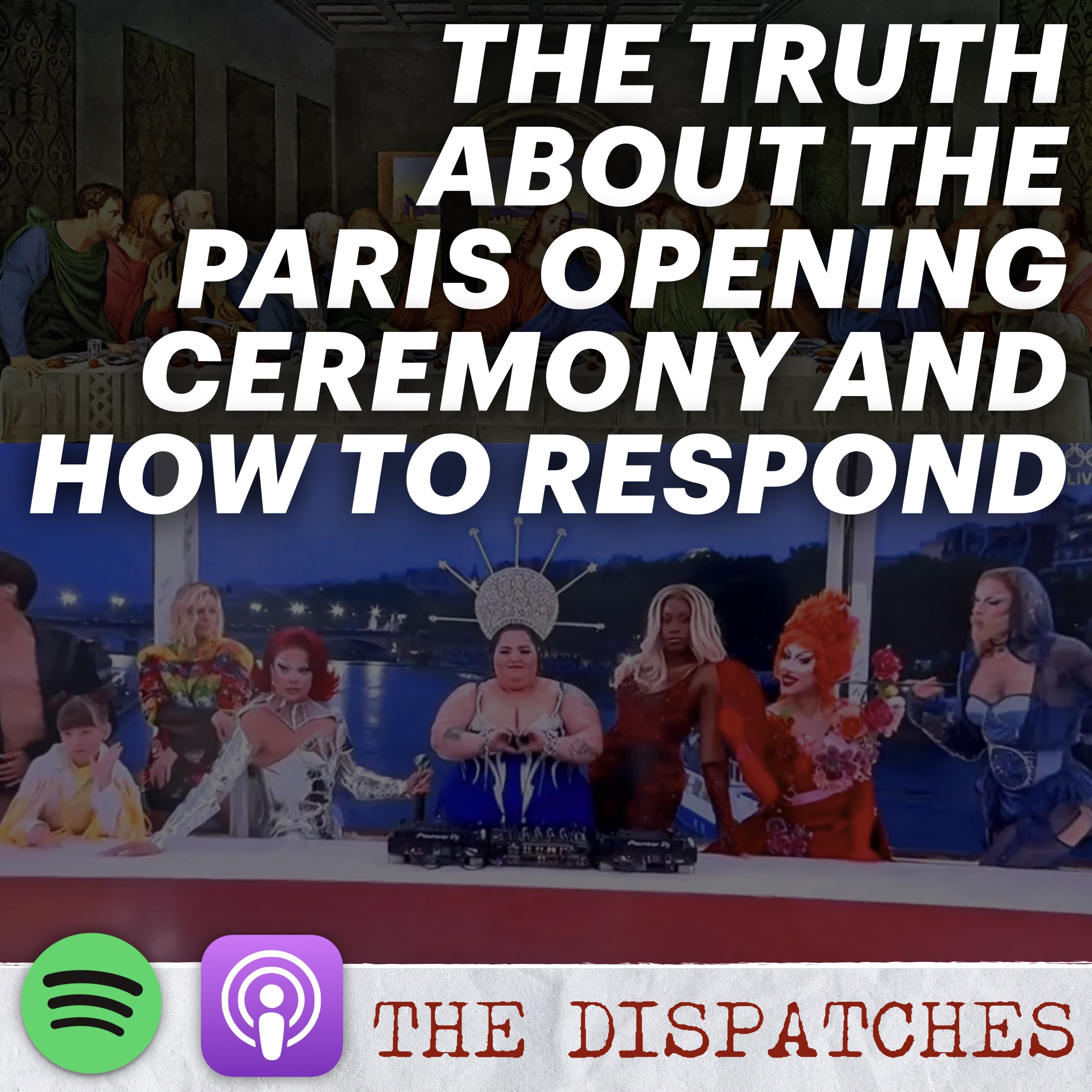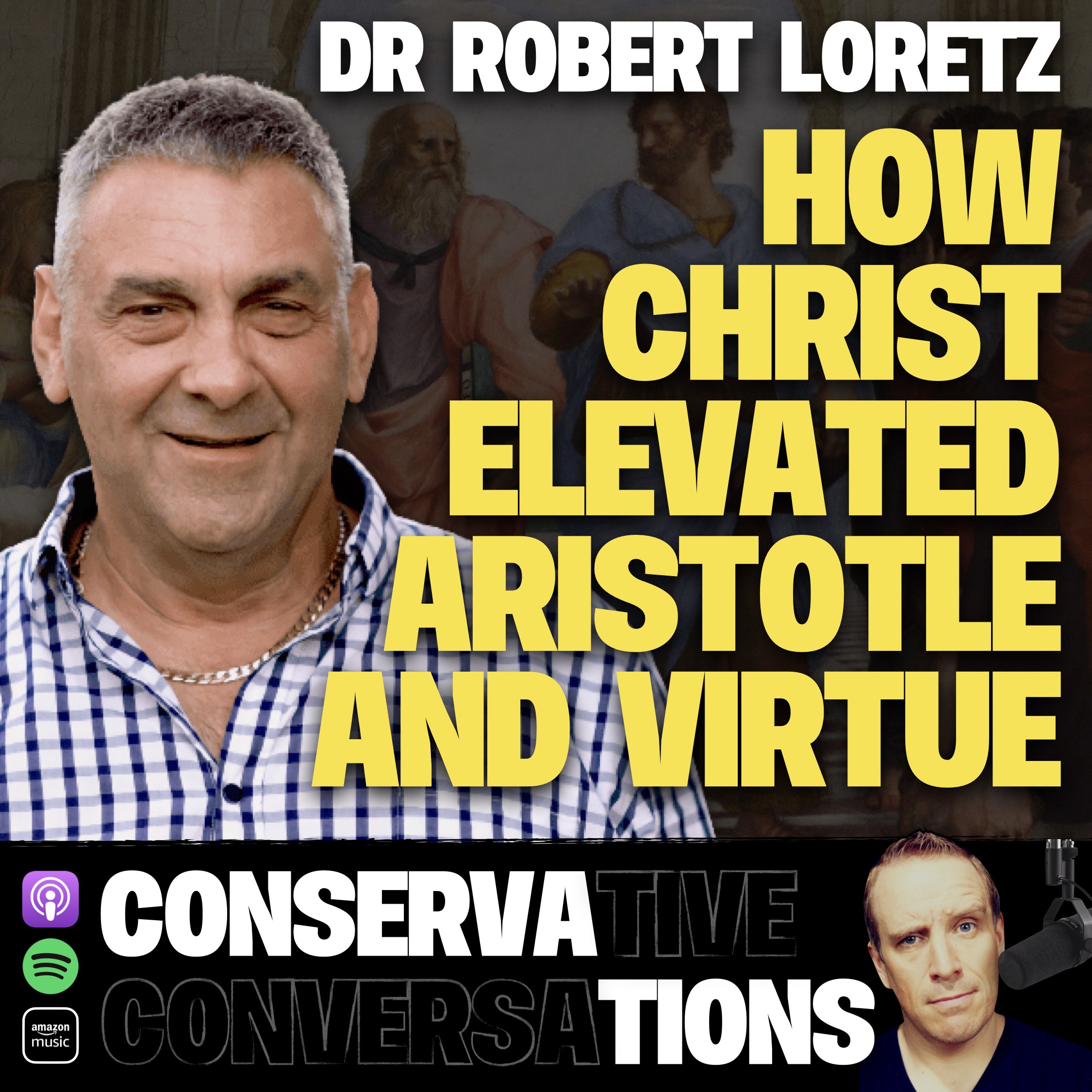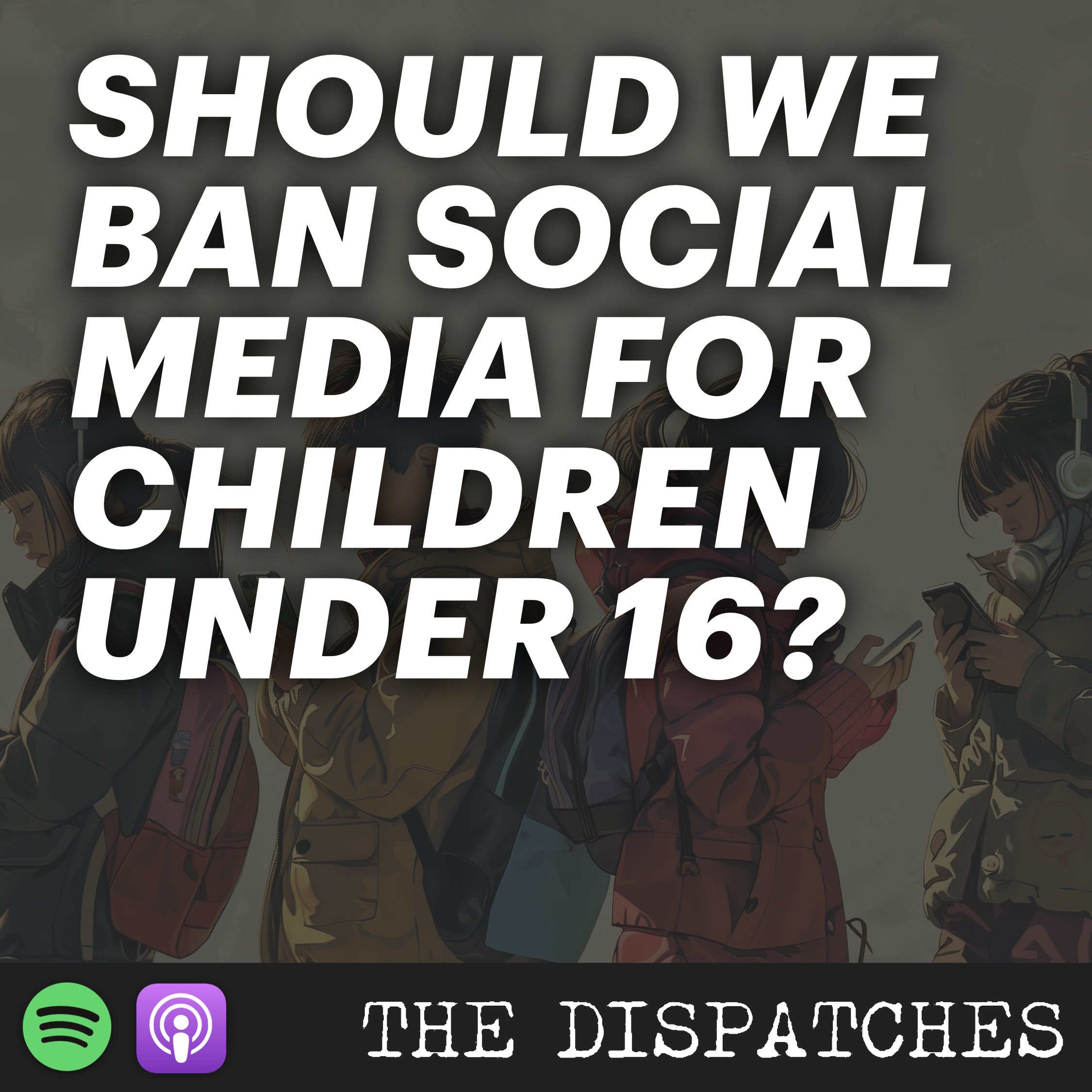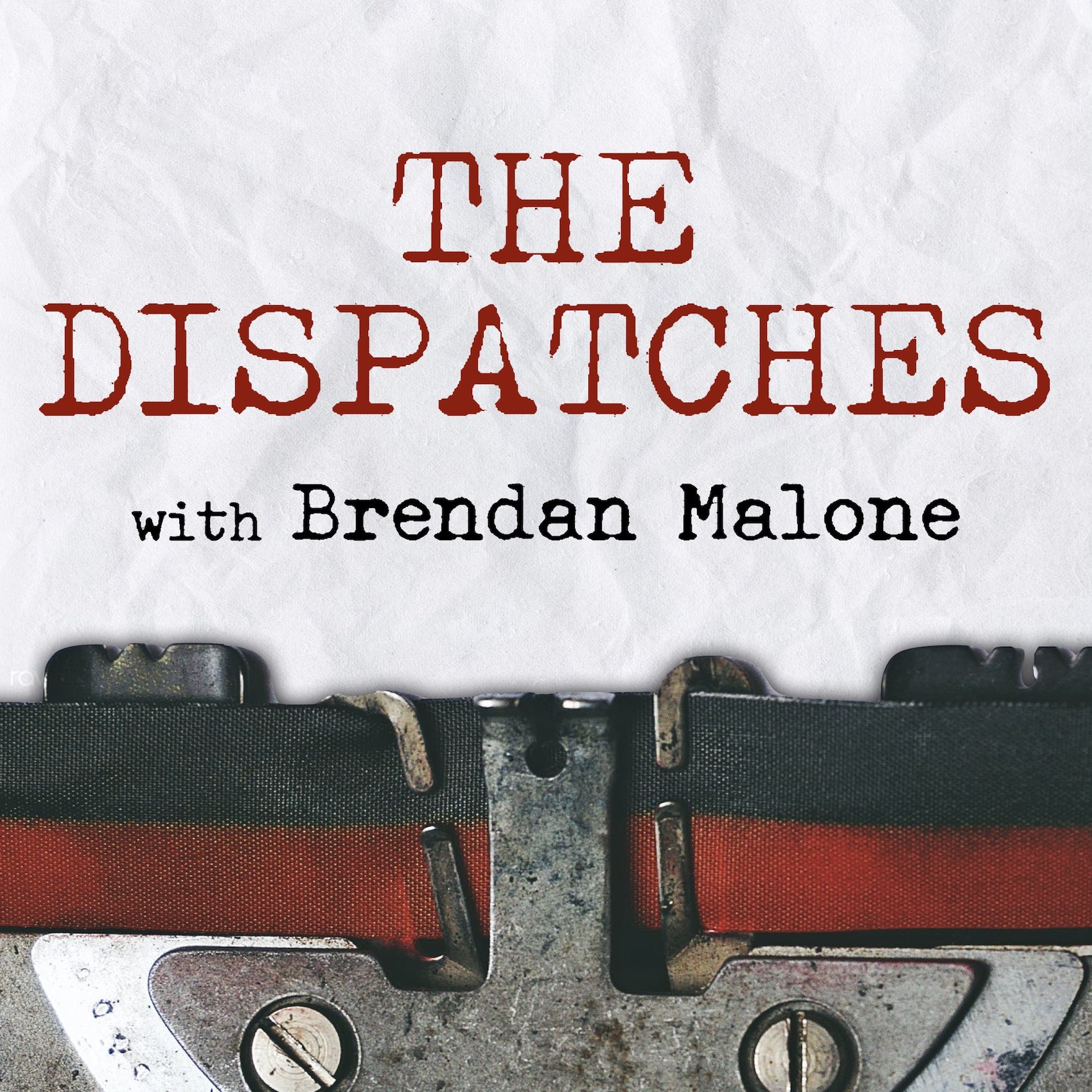[00:00:00] Speaker A: Hi, everybody. Welcome along to the Thursday Freebie edition of the Dispatches podcast. My name is Brendan Malone. It is great to be back with you again. And today we're a little bit unusual because we normally have a Friday freebie. We are going to have one of those tomorrow. But today we're also having another free episode of the Dispatchers podcast. And that is because I'm interviewing Jonathan ailing of the free speech union about a truly astounding case, and I don't say this lightly, that will be in the New Zealand courts tomorrow. That's Friday New Zealand time. A Wellington man who is facing serious charges after engaging in a peaceful act of pro life speech with someone in a public space. I really can't state how serious this case is and how astounding when you actually hear the circumstances of what's gone on here. Before we get to that, though, don't forget, if you want to support the work of Leftfoot media and get access to a daily patrons only episode of the Dispatchers podcast, that is a daily piece of audio commentary on culture and current affairs every single day of the week, Monday through Friday, then go to Patreon, the link is in today's show notes, and become a five dollar monthly patron. Less than the cost of a cup of coffee is all it takes to get access to a daily episode of the Dispatches podcast. A huge thank you to all of our patrons. It's thanks to you that episodes like this one are made possible. So, without any further ado, let's now hear from Jonathan ailing of the free speech union about this truly astounding case of a kiwi pro lifer who is now facing serious criminal charges and will be in the courts tomorrow. Friday New Zealand time.
Hi, my name is Brendan Malone, and you're listening to the dispatches, the podcast that strives to cut through all the noise in order to challenge the popular narratives of the day with some good old fashioned contrarian thinking. You might not always agree, but at least you'll be taking a deeper look at the world around you.
Jonathan, thank you so much for being with us again. And I was going to say it only seems like a couple of weeks, because that's true. It has only actually been a couple of weeks since you're with us. But I want you to talk to us about a very important incident today. And it also dovetails into something else you've been speaking about and warning about publicly in the last couple of days as well. Before we get into any of that, though, tell our listeners who might be new here who might have never heard you before. Tell us a bit about yourself and what you do.
[00:02:28] Speaker B: Well, I'm the chief executive of the Free Speech union and this was an organization that really stepped up in 2021. The hate speech laws were announced by the minister of justice at the time, then Chris Farfoy and a relatively small volunteer group had existed prior to that, running a few court cases on speech issues and such. And they said, look, we either need to do this properly or we might as well not do it at all. And so they looked for anyone who would be able to run a really strong, really professional campaign and not being able to find that, they invited me to do it.
So we ran a campaign for five weeks on that and it was the largest public consultation campaign ever run. We had about 20,000 submissions. It's not the largest anymore. Since then we've beaten our record, but we went from 5000 to 45,000 supporters and really tapped into a little bit of a current of concern around what we consider is the most foundational rights in our human rights or civil liberties framework, which is the right to think and the right to express those thoughts. And so the freedom of conscience and the freedom of speech, they are not extricable in any way. They are mutually reinforcing. And so since then, we have brought on a larger team. We have about ten on staff now. We have four key work streams. We work across cases, and that's something we'll discuss more today, where we currently have eight fights before courts or tribunals looking to defend individuals speech rights according to the current law. We also have campaigns, which is where we either push back on bad legislation or fight for better legislation, or go into universities or the media or the public service and such, where we are advocating for the cultural value of free speech. I do lots of media. I get to talk with lovely people like yourself and write op eds.
We do events and speaking tours, so that's content. And we also go into high schools and we go into universities and we try and raise up a new generation of free speech advocates. And that's coaching. So cases, campaigns, content and coaching are our four work streams. And look, I guess two kind of last comments in this regard.
I am really astonished every day at the generosity and support that over 100,000 Kiwis now offer us to be able to do this work. It is so humbling. And the team that I get to lead, our incredibly passionate, incredibly dedicated, almost all of us are in our twenties. We've got two people that are not in our twenties but the rest of us were a relatively young group, but really dedicated to this idea that even. Well, not even, especially those that we disagree with the most must have the rights to be able to voice those opinions. That's one side of it. The other side is, I'm also shocked every day just at what comes down the pike and the. The real state of one of these foundational questions to democracy that has been so neglected and we've taken so much for granted. And I think even just over the past five years, I would say a lot of ground has been lost, both in real terms and court decisions and political decisions, but even more importantly, in the cultural value and the belief that the kiwi public has and the importance of letting people speak freely. So that's why every day I believe more and more how important it is that we make a stand. Now, free speech is very difficult to fight for if you don't have free speech.
[00:05:59] Speaker A: We're going to talk today specifically about one of those cases. And I think this is a really important case, partially because I am someone who is involved in the pro life education space. I care a lot about this issue. I've been working almost full time, 20 years now in this space. So I have a heart for this and I connect with it that way. But also just the gravity of what's gone on here. I just, like, I really struggle to get my head around this. It's really quite astounding. Before we get into the specifics of what happened that led up to police involvement, and now there's a whole court case around this. Tell us a little bit about this gentleman and the social activism that he's engaged in, even though I foreshadowed it a little bit. Just tell us a little bit about him as a backgrounder, and then we'll get into the incident.
[00:06:42] Speaker B: So there's a gentleman who is otherwise, I think he would admit, relatively nondescript. He's an insurance salesman who is a. Is a good papist. And on Sundays he goes to mass, and then on Sunday afternoons, he goes out with a sign that reads a. He's taped bills for a $100 there, a $100 for anyone who can show me that slavery is more evil than abortion. And he invites passersby to engage with him in a conversation. And look, Brendan, if we believe that bad ideas are beaten by better ideas, if we. If we believe in truth and that the truth is not overcome by evil, that it. It shines in the darkness and the darkness has not overcome it, then we believe in the idea that letting people express their falsehoods and their errors is not a problem because it invites them into a conversation with where they can encounter truth. And so I think if putting aside whether or not your listeners agree with Paul Burns position on this, this is exactly how we should go about building social cohesion and engagement on contentious issues.
He has quite a few stories, though, around times when he has been engaged with far less than civilly. He's been robbed several times. You put cash like that there and you make an offensive, an implied offensive claim that actually abortion is more evil than slavery. And so people have taken the money several times. People have broken his sign, he's been shoved and accosted, never anything very seriously. But it's a general demeanor of how dare you even want to promote this conversation.
[00:08:26] Speaker A: And to be clear, he's doing this in Wellington too, right? Which is, it's a pretty bold thing, strategy to adopt in a place like Wellington right now.
[00:08:34] Speaker B: It really is. And he does it a stone's throw away, though perhaps that's not a good comment to use, given the parliament protest. But the stones throw away from parliament, where, of course, legislation was passed to prohibits people from protesting or expressing opinions on abortion outside of medical facilities. So of course, he's not breaching that law. But that is the. We don't have legislation that prohibits advocating on an issue within a certain number of meters on any other issue apart from that. So you're right, it's quite a bold stance. On. One afternoon, he got in a conversation with a couple of young people.
The police officer who ended up arresting him described them as youths. And so these youths were engaging with Paul Burns on the subject. And one particular young man said, abortion is not only not evil, it is good because our world has too many people in it. This is what is partially driving climate change. And so the fewer people that are born, the better. So the more pregnancies that are terminated, the better. And Paul Burns responded to that with a logical next step. It's a provocative claim that he made, but in an argumentation and logic, provoking the other side with logic and reason is a good strategy.
[00:09:58] Speaker A: Well, there's also a certain provocative dance of rhetoric going on here that's very normal. It's not irrational, it's very normal.
[00:10:05] Speaker B: Well, and the claim that abortion is not only not evil, but a good is in itself quite a provocative stance as well. But you're right, there's a little bit of a tango going here. I mentioned they were both enjoying that. And Paul said and said several times, well, if that is the case, why don't you kill yourself? How do you justify your existence then? If your existence is harmful to the world and other people's existence is not justified, it seems, whether you agree with his position on pro life or not, to be a logical step from his perspective.
[00:10:39] Speaker A: And I want to, can I say on that point, and this is quite important, my eldest daughter, who's in high school, was in a very similar public conversation with a person at a street event just last year. Same issue, similar kind of rhetoric from the other side. And she said pretty much the same thing.
She said, well if that's, if your life has no meaning, then why wouldn't you end your own life?
[00:11:05] Speaker B: Just to underscore here as well, Paul Burns is there as a pro life advocate. So it's not like he is in fact advocating for anyone to go and top themselves. He is using the way that he sees the fallacy of their logic against them.
An officer came along and unbeknownst to me at the time, section four B, I think it is, of the summary Offences act, says that it is illegal in public to knowingly and intentionally offend someone. And this rhetorical exchange had caused offence not to the individual that Paul Burns had been speaking with, but to someone else. And so an officer came along and placed him under arrest. He was taken to the police station and booked and charged. He is now had to appear before the court. And next Friday, on Friday the 9 August, he will be.
He will appear there again. At the last appearance they took the charge which as the free speech union, we quickly came to his defense. This is what we partially why we exist, to ensure that individuals who have the courage and the temerity to exercise their speech rights have someone standing in their corner against. And Brendan, this is all they are against bullies. And it's not okay to bully in kindergarten, it's not okay to bully in school and it's not okay to bully on the streets of Wellington. And that's what these police officers are doing and it's condemnable, it's outrageous. And while at the moment we are defending them against the charge they have brought forward, once we get through this, we're going to go on the offense. We're already suing the police in another case. Well we've got, we've got eight cases at the moment for the courts. Three of them are for wrongful arrests. One of them is already in the counter stage where we are not defending someone, we are suing the police for wrongful arrest. And it is very likely with the Paul Burns case, that once we have gone through the process of defending him, we will countersue for the absolute unacceptable nature of this arrest. And. And what happened was we actually thought, surely this charge will get thrown out. Police kind of use their power a little bit and this is their right. They get to, you know, place an arrest and then before long, they can withdraw the charge and it just lowers the tension of some situations. But not only did they not withdraw the charge, they upped the ante on it and increased the charge. And now he is also facing disorderly conduct. And so it. It's an important case for us to come in on. We've got a good lawyer, our chairman is offering him pro bono defence and we will throw everything we have at this case because it is so emblematic of the fight that we have on our hands at the moment.
[00:13:59] Speaker A: So let's just clarify this really important point that you've made here. This effectively comes down to not the person he was in conversation with taking any offence. So he said, no, I didn't offend me. Someone else who's a bystander, who's not having any conversational dialogue directed at them said, I'm offended. And then the police have intervened and they're now basically policing what you. I think it's fair to say this is hurt feelings and snowflakery. They're now making a discernment. Is this crossing a line? You know, they're getting into this very surreal and totally arbitrary and subjective place of policing emotional distress. And they've added. They've upped the ante as well.
[00:14:39] Speaker B: That's. That's correct. And I don't know if many of your listeners have read 1984 recently. If you haven't, I encourage you to. But in that Winston, the main character, makes this comment about the particular ferocity of young women in his context, around the way that they pursued support for big brother and attempts to stomp out any sort of opposition. And it was. It's quite a telling perspective, I think. And both the police officer and the individual who felt offended and sought help from the police officer, both of them are young women in these cases. And that's just a passing comment. I don't know if it's politically correct to make that observation, but I would say it plays into the narrative that both of them, I think, felt particularly affronted by not how Paul Burns was conducting himself, but what he was claiming. And police have every right and a duty to attend to how individuals conduct themselves in public in New Zealand, however, they have no duty reviewing the substance of claims like this. And that, it would seem, is what has occurred here.
[00:15:49] Speaker A: It's quite interesting you should mention that because I wasn't going to talk about it, but I actually thought about it earlier as you were speaking, and we were talking about the sort of provocative rhetorical dance that's going on here. This is a very typical way for two men to actually just tease out, debate, out, dialogue, out an issue. It seems to be generally, as men, we're not afraid to sort of just. I guess we're robust, we are very different. We don't have that same emotional iq as women and so we tend to just go straight for the logical, cold hearted defence of our position and tearing down of the other, whereas the female approach is different. And so it's interesting to note that there is a gender difference in what's going on here.
[00:16:27] Speaker B: And I thought this was a situation that was bad enough as it was, and yet what the free speech union has been working on over the past week has this. It's one of the most serious issues we have ever come across, I think, and it comes in tandem while we're running a separate campaign on another very serious issue. It's just passing by, we don't have time to get into it this morning. The Law commission is currently consulting on whether it should become a criminal offence to misgender out or dead. Name someone. And if this sounds incredible, as if surely not, that would never happen in New Zealand. You use someone's wrong pronoun and you face a criminal offence. This is exactly the case already in Canada and within the wider auspices of that conversation, there are people in prison and people on parole in Canada for not operating and repeating the lines sufficiently on the gender question. And so if you are interested in that case, you can look that up at free speech submission dot NZ, where we're currently helping people to engage on that issue. But we're running a campaign on that and that's requiring enough attention as it is for our team. And yet we were then leaked information that corresponds back to the Paul Burns case. We will release material from a current police officer who showed new training that they are required to do on hate speech and hate crimes to identify the processes, recognize, record and respond to hate speech and hate crime. And I just really want to make very, very clear, New Zealand does not have any laws whatsoever on hate crime. And so for the police to be training police officers to recognize, record and respond to potential, quote, hate crimes is the definition of extrajudicial and prejudicial. It is prejudicial. It is before the law. It is before parliament has instructed, as the only legitimate lawmaker in this country has instructed any of its subsidiary authorities to enforce this law. It is the definition of prejudicial. And as if that wasn't bad enough, the material is shocking. The examples that police have been primed with of hate speech and hate crime are claims like a sign that says there are only two genders, or the claim. An example simply was a protester holding the sign and the sign said free speech. That was it. And that is an example now of someone who police should recognize, record and respond to. A claim like Kiwi, not iwi, is now an example of hate speech, a slogan that not 20 years ago was the campaign slogan for the National Party. And now it is an example of something the enforcement arm of the state should seek to recognize, respond, record and respond to, and if necessarily violently address. They are the theoretically only legitimate power to be able to use force in this nation and they are saying this is the sort of thing we should use force to. So you hold that up in correspondence with the Paul Burns case or with the fact that the law commission is now looking to criminalize, possibly misgendering, dead naming or outing. And it presents to me, Brendan, a truly troubling state of affairs, where in 2021 and 2022, the government considered, on three occasions, three different presentations of attempts to amend hate speech laws and ultimately were rebuffed. Three times, I would say, principally because of the work of the free speech union. And so parliament has decided not to go down the space. It is not changing our very high standard for hate speech laws and we have no hate crime laws whatsoever. And the public service, on three occasions last week, the law commission, through what they're currently consulting on, the police through what they're currently training on, and the chief censor going on Q and A and saying that our hate speech laws are currently not robust enough and that we do not have free speech in New Zealand. We only have freedom of expression, which is a different thing. She was patently wrong. And it shows to me effectively a mutiny within our public service that says, frankly, bugger parliament. We know the right approach here and we will implement it. And they are treating the royal commission of inquiry into the Christchurch mosque attack as gospel on this. This is where they are drawing their response. Recommendation 42 is what the police are building on, where. Where the royal commission recommended to police that they review the way that they record hate speech and hate crimes. Now, had parliament passed laws to enable them to do that. That would then be appropriate. You do not get out ahead of the representatives of these people on this, though. And parliament chose not to do that. Government was pushed back. And it is one of the most extreme middle fingers I think I've ever come across in my career in this space where parliament and the representatives of people are being tiredly ignored.
[00:21:50] Speaker A: It's. It's quite astounding, really. And I did an episode on this, actually, yesterday for my monthly subscribers, this specific incident. And I talked about this as a prime example of the bureaucratic state, the managerial classes in action, unelected, unaccountable, with the real power behind the throne. But I also stressed the point that when the police record you and when they respond to you, that is serious, like that is a. That's. That can follow you around for life. What we've got here is a situation where the bureaucratic elites, the power behind the throne, have set up, effectively a type of thought policing department, using the New Zealand police, co opting them for that purpose. And now they have the potential to attend public events, public conversations, any dialogues where they're basically within earshot of. And they now have the ability to determine whether or not you should be prosecuted for saying the wrong thing. Like it's beyond even just a debate about what is hate speech. This is now active policing of thought and conscience, and in a very real, tangible way.
[00:22:53] Speaker B: And the implications are quite significant, because there are what this. What the public has decided are legitimate checks on those who could otherwise access firearms and that kind of thing. And so if the police now hear someone at a public rally make the claim, it is my free speech to claim that there are only two genders. Well, according to the training that they've been primed by, that falls twice within the criteria of what they should recognize, record and respond to. And if that person, otherwise, who has no criminal record, goes and tries to access a firearms license to take their son down to the shooting range, they will possibly be barred from doing that. And the implications for other areas become more compounded. It's truly concerning. And I would say at the moment, I don't see anyone else, Brendan, talking about these issues and pressing into them. So the free speech union, I'm sitting down with the police commission early next week. I'll be honest, I don't have very much hope for that conversation. I know Commissioner Costa personally, and he's a good man, but this is outrageous and we will effectively. We've said it stops or we're going to court. And I just cannot fathom that a high court will see the police stepping out beyond the remit of parliament as anything but illegal. And so I think, look, if this is an issue that you care about, the free speech union is the only one pressing into it and we need members to stand with us. And so FSU NZ join is where you can come in and join thousands and thousands of other Kiwis who are trying to push back against the lanyard class, who are undermining our basic liberties.
[00:24:39] Speaker A: Before I ask you one last question, I'll ask you a second to last question. And that is this. How do you feel about the Burns case?
I realise you can't talk about specifics necessarily, but what's your sort of sense of how this is likely to play out?
[00:24:56] Speaker B: Look, I don't think there are any specifics that we can't talk about. This just seems to be a blatant overreach. And that's why from the outset, we looked at this and said, absolutely, we'll take on this case. And as soon as we're through this portion, we will sue the government for wrongful arrest. And with Ben's case, I mean, I shudder to think that we could lose a case like this if we do. I mean, that just really shows you how far the judiciary has gone. This, I think, falls entirely squealing in exactly what our speech rights, what's a confirmed by our Bill of Rights act, are designed to protect. And so we're hopeful that even still, that the charge could get thrown out, or we will see a judge quite furiously respond to why this ever came across their desk. But look, with the state of things, it could go the other way. And if that happens, we will. It's indicative of the chilling times we're in.
[00:25:52] Speaker A: One last question, then, to wrap this all up. I know we're not a litigious culture and people often talk about lawfare in a very sort of pejorative way, but this is important and this is how you protect rule of law rather than rule by law. Just quickly, to wrap this all up, why is it important that we do have voices and organisations actually using the law?
[00:26:11] Speaker B: Because otherwise bad actors can push in for everything that they get and the better nature of the rest of us lets them get away with it. And what I found, Brendan, in our legal defense, in our political defence, and the content and coaching work that we do, what I found in school, if you push back on a bully, often they fall over. And I would suggest that this would be. Sensors have taken advantage of our better nature for far too long and are not used to, if I can say this, a professional, talented, passionate team coordinating and often running rings around them. And the essence of the sensorial perspective is a deficiency of argument. They do not have logic and reason and good argumentation on the sign, so they reach for force. And at the moment we still have good levers on our side to push back against them with that. And we need to use those levers effectively now, otherwise we will see those freedoms taken from us as well.
[00:27:14] Speaker A: Jonathan, I know you're a busy man and it's been hard to try and tee up this interview and you're doing some great work. So thank you so much for taking the time to have the conversation today.
[00:27:22] Speaker B: Cheers.
[00:27:23] Speaker A: So there you go folks. I hope you found that conversation informative and engaging. And don't forget, if you care about this issue and you do want to actually get involved, then go to the free speech union website. I'll post a link in today's show notes and make sure that you get connected with them and get behind the important work that they are doing. Thanks again for tuning in. Don't forget live by goodness, truth and beauty, not by lies, and I'll see you next time on the dispatches.
The Dispatches podcast is a production of Leftfoot Media. If you enjoyed this show, then please help us to ensure that more of this great content keeps getting made by becoming a patron of our
[email protected].
leftfootMedia link in the show notes thanks for listening. See you next time on the dispatches.
